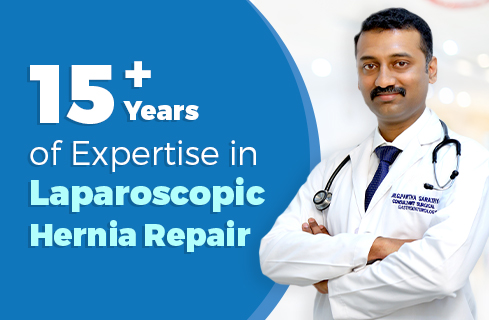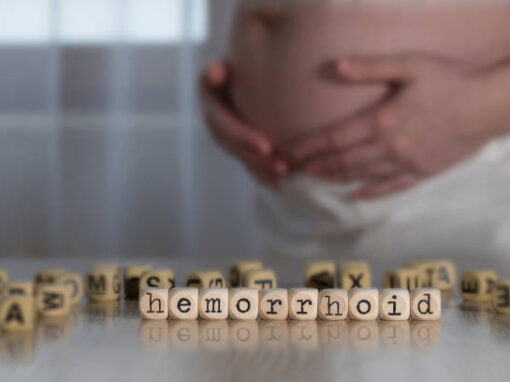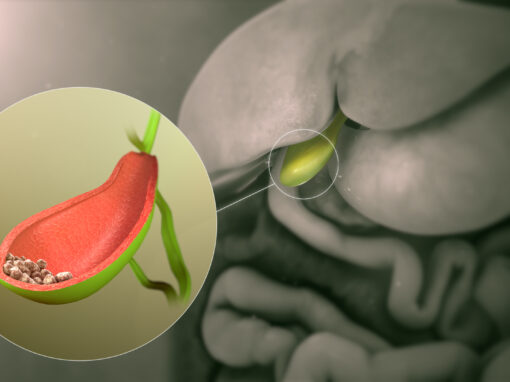Diaphragmatic Hernia Surgery in Hyderabad
Diaphragmatic hernia is a congenital condition in which a hole forms in the diaphragm (the big muscle that divides the chest and abdomen). Organs in the abdomen (such as the intestines, stomach, and liver) can pass through the diaphragm and into the baby’s chest. Hernias occur when an organ pushes through a hole. A diaphragmatic hernia can hinder a baby’s lungs from fully growing, resulting in breathing issues at delivery.

What Causes a Diaphragmatic Hernia?
A diaphragmatic hernia happens during the baby’s growth in the womb. The diaphragm is not completely grown. As a result, organs such as the stomach, small intestine, spleen, liver, and kidney may occupy a portion of the chest cavity.
Congenital hernia of the diaphragm most commonly affects only one side of the diaphragm. It’s more frequent on the left side. Often, the lung tissue and blood vessels in the region do not grow properly. It is unclear if the diaphragmatic hernia causes the undeveloped lung tissue and blood vessels, or the other way around.
Forty percent of newborns with this issue have further difficulties. Having a parent or sibling with the disease enhances the risk.
Identifying Symptoms of Diaphragmatic Hernia:
Severe respiratory issues frequently arise immediately after the infant is born. This is due in part to inefficient diaphragmatic muscle movement and lung tissue congestion. Breathing difficulties and low oxygen levels are frequently caused by undeveloped lung tissue and blood vessels.
Additional symptoms include:
- Lack of oxygen causes bluish skin.
- Rapid breathing (tachypnea).
- Rapid heart rate (tachycardia)
How is Diaphragmatic Hernia Diagnosed?
During pregnancy, there are screening tests to look for various birth abnormalities and other problems. Doctors can typically identify diaphragmatic hernias before the baby is delivered. Doctors use ultrasounds to obtain images of the diaphragm and lungs in order to detect problems.
Ultrasounds during pregnancy do not always reveal diaphragmatic hernias. However, when the baby is delivered, doctors may diagnose the disease based on the newborn’s difficulty breathing. A chest x-ray might reveal that organs typically found in the belly are now in the chest, and the lungs seem smaller than usual or pushed to one side.
What are the treatment options for Diaphragmatic Hernia?
A diaphragmatic hernia repair necessitates surgery. Surgery is performed to properly arrange the abdominal organs and fix the diaphragm hole.
The infant will require breathing assistance during the recuperation phase. Some newborns are placed on a heart or lung bypass machine to help them get adequate oxygen.
The result of surgery is determined by how well the baby’s lungs grow. It also depends on whether there are any further congenital issues. Infants with a significant quantity of functioning lung tissue and no other abnormalities often have a fair prognosis.
Medical improvements have allowed more than half of newborns with this disease to survive. Babies who survive frequently struggle with breathing, eating, and development.
Dr. Parthasarathy is one of the best hernia specialists in Hyderabad. As a renowned hernia surgeon in Hyderabad, Dr. Parthasarathy has performed hundreds of hernia surgeries successfully. We offer advanced laparoscopic Hernia surgery for a variety of hernias, including umbilical hernia, inguinal hernias, incisional hernias, femoral hernias, Hiatal hernias & diaphragmatic hernias.
FAQs
Is diaphragmatic hernia surgery painful?
Diaphragmatic hernia surgery is performed under anaesthesia, so you will feel no pain during the procedure. You can experience some pain and discomfort for 1-2 weeks following the surgery which can be managed with medication.
What happens if hiatal hernia is left untreated?
It is best you undergo hernia repair surgery as early as possible because as the hernia grows bigger the muscle walls of abdomen get weaker and more tissue bulges out increasing the chances of complications like strangulation and tissue death.
What is the hospital stay after diaphragmatic hernia surgery?
You will be able to get back home on the next day of hernia surgery. You will be able to return to work within 1 to 2 weeks after surgery. You can undertake strenuous activity or exercising after 6 weeks.
What is the cost of Diaphragmatic Hernia Surgery in Hyderabad?
Hernia surgery is covered by all major insurance providers & TPA. Our hospital offers cashless facility for all major insurances. Please contact +91 73309 90044 for other insurance details.





